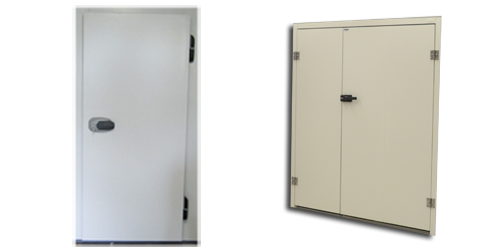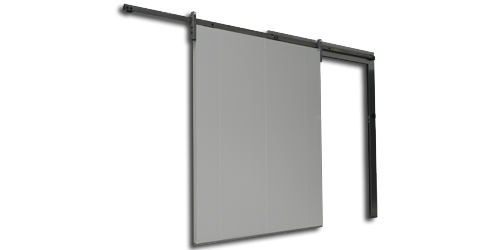Isolated doors
Working in low temperatures presents extreme conditions and requires specialized solutions. Sliding refrigerated doors must meet a number of guidelines. First and foremost, they should not only be resistant to ordinary mechanical damage but also to the cold, which can also destroy them. Another important feature of these products is their resistance to corrosion, which often occurs in the harsh conditions present in cold rooms and freezers. Acid resistance is also significant, as in many industries, the doors may be exposed to daily contact with such substances. They must also be exceptionally airtight and should not allow temperature to escape, generating related losses. Maintaining a low temperature in the room is indeed their primary task.
What are the best materials for cold storage doors?
In places such as cold storage and freezers, it is essential to use products and materials that are resistant to extremely low temperatures. Therefore, cold storage doors are typically made from stainless steel, acid-resistant steel, or coated materials. This surface can be painted in a chosen color, providing aesthetic appeal and allowing it to match the decor of the entire room. A strong, durable construction ensures that the doors will reliably perform their function for a long time, effectively isolating the designated area from the rest of the building.
In the materials used, not only is temperature resistance important, but also insulation properties. Doors for refrigeration chambers ensure that the temperature in a given room remains appropriately low; any increase in temperature can lead to irreversible damage to the products stored inside. They are also ideal for places where high hygiene standards are essential, as is the case in all food-related industries. Therefore, we recommend products that have all necessary certifications and are approved for contact with food products, such as meat.
Where do refrigerated doors work effectively?
The proposed sliding refrigerated doors are effective in many places. They are most commonly associated with the gastronomy industry. It is in this sector that it is essential to store many products at low temperatures to prevent spoilage. Refrigerators hold meats, vegetables, fruits, dairy products, and other items, such as medicines, which would quickly become unsuitable for consumption at higher temperatures. Therefore, refrigerated doors are used by shops, supermarkets, restaurants, small dining establishments, and hotels that operate restaurants or serve meals to guests.
Using high-quality doors for the refrigerated chamber from a reliable manufacturer is an excellent way to keep goods fresh for a longer period. This allows for the storage of larger quantities, which is more convenient and financially beneficial than frequently ordering small supplies of food products. Therefore, they are eagerly chosen by clients who run large businesses that process a vast number of items daily.
Another application of refrigerated doors is their installation in production halls where employees work with food items that require storage at low temperatures. The doors serve as effective barriers between production areas and other rooms that do not function as cold storage. They are thus suitable for production facilities, as well as warehouses, wholesale distributors, and establishments in the meat and dairy industries. The market offers many different types of refrigerated doors from well-known manufacturers. Depending on their intended use, they can vary in construction, materials used, and size. We offer our clients products such as hinged doors for freezers and cold rooms, sliding doors, and technological doors. Read more.

Hinged cold room and freezer doors
In our offer, we have doors for freezers and cold rooms. The most popular and simplest construction type is hinged doors. The maximum passage width for a single leaf is 1400mm. The doors are standardly equipped with a lock, including a "safe" option, as well as a visible element on the inside that allows for the door to be opened from the inside (even if the door is locked).
Check out our other products:
- Cold storage rooms
- Isolated panels for cold rooms
- Modular cold rooms
- Freezers

Cold room and freezer sliding doors
Sliding doors do not take up space in the corridor or passage. Additionally, by transferring the weight onto the track, these doors can be made in much larger dimensions than hinged doors. Such doors can also be used in both cold rooms and freezers.
Technical doors
This is a group of doors with insulated panels; however, they are not intended for isolating spaces with low temperatures. These doors are more often used as partitions between, for example, production areas or to separate a room that is not a cold storage or freezer.

